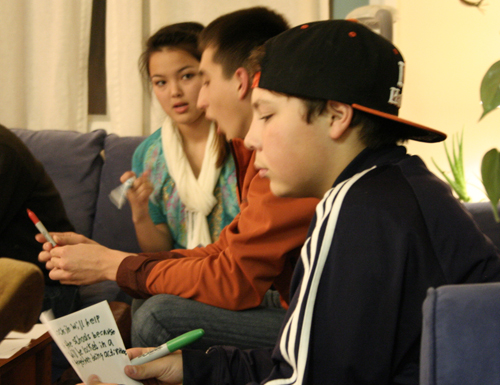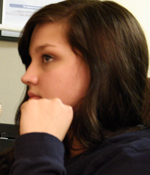
SYLC members Mikaela Hunter, Nick Bouker, and Cisco Mahoney (left to right) brainstorm how different group activities help them build bridges across cliques and schools — one of the committee’s main goals. One of the team’s more intense activities is an annual, week-long kayaking trip in Glacier Bay National Park. Photo by Anne Brice/KCAW
Teenage years are filled with change, and navigating relationships among peers is a big part of everyday life. Bullying and violence are just some of the pressures they face. In Sitka, a group of teens is pushing back against this norm by practicing open and honest communication.
This is a video by the Sitka Youth Leadership Committee, or SYLC.
“A time that i felt like i didn’t belong is when I felt left out by my peers, whom i had full faith and trust in…it felt like I just didn’t want to be around those type of people, and it made me feel worthless.”
The group is made up of about a dozen high school students from Mount Edgecumbe and Sitka High. They’re describing how it feels to be without a sense of belonging.
“I felt like I was in darkness. I was silenced. I was alone. I was not accepted. I was not cool enough, and I was left outside the circle of my peers…”
Katie Davis is a member of SYLC. “Feelings get hurt and people talk a lot,” she said. “There’s a lot of gossip, things like that.”
She’s 16 years old and goes to Sitka High School, where she says direct communication strengthened her personal relationships.

Katie Davis, 16, says since she started SYLC, she’s made an effort to understand people’s emotional needs by reading their actions. Photo by Anne Brice/KCAW
“My friends were upset with me because I chose to hang out with other people on Halloween,” she said. “I felt as if they just shut me out, and then I was sad. And I learned it wasn’t going to get any better unless I said something about it. Once we finally communicated face to face, instead of talking to other people, and having it come around back to us, it was resolved right then and there.”
Fourteen percent of high school students reported having been bullied two or more times a month. By using straightforward honesty, the committee hopes to create a community where people feel safe to express their emotions, and inspired to work together.
Julia Smith is a prevention coordinator at the local shelter, Sitkans Against Family Violence, or SAFV. She’s working with members of SYLC to replace violence with respect and compassion. Smith says it starts by asking some tough questions.
“What are the societal factors that are contributing to this culture of violence?,” she said. “You know, that is either encouraging it to happen or what are those factors that inhibit it from happening? And how can we build upon those factors that are creating a culture of respect, and a culture where violence is outside the norm.”

Julia Smith says communication is a two-way street. “There’s no way to really know how somebody feels or what they need,” she said. “But we can guess and we can ask and we can be curious, and then, we can also make a request for what our needs are.” Photo by Anne Brice/KCAW
Smith says we live in a culture of dominance, where louder voices often get more attention.
“We all have different rhythms, different styles of communicating,” she said. “So, how do we create a space where the more introverted personalities feel like the time and the space to to speak, and that they will be heard?”
Veronica Nelson is a student at Sitka’s alternative school, Pacific High. She says bullying is a part of life that needs to stop.
“I’m constantly reminding people, hey, do you remember what it feels like to be made fun of? And they always say yes,” she said. “Someone has always been made fun of. No matter what. Whether it was once in your life, or 20 times a day, someone’s always been made fun of.”
Nelson is in a leadership group at school, and like the youth in SYLC, she has learned that by combining everyone’s strengths, the outcome is that much more powerful.
“I think everyone has a bit of a leader in them. In one way or another,” she said. “Whether it’s being quiet when you need to be quiet. Sometimes I can’t shut up. And then it’s speaking up when you need to speak up, some people can’t speak up. So everyone has a piece of a leader in them. it’s just a matter of coming together and making this giant group of leaders.”

Nick Bouker and Heidi Kritz attend Mount Edgecumbe, where they work to recruit other students to join SYLC. Photo by Anne Brice/KCAW
In 2011, the State of Alaska Department of Behavioral Health awarded a grant to Sitka’s primary prevention coalition. It’s called Pathways to a Safer Sitka, and it will receive $200,000 every year over a four-year period. Youth leadership groups are an example of primary prevention programs, which aim to stop violence before it ever starts.
“When I feel like I don’t belong, people put me down, reject me, and I’m all alone,” SYLC members say in the video. “Judgement is something that everybody does subconsciously, but it’s a habit that needs to be broken. We need to love each other. It is the best feeling in the world to feel accepted and to belong. Hate is violence. We need to stop hate. It’s time to take care of each other because we all belong.”































